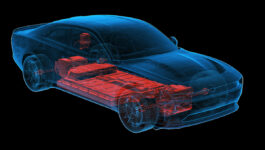
Stellantis will test solid-state batteries
In 2026, some Dodge Charger Daytonas will be equipped with prototype semi-solid-state batteries. ©Dodge
While sales of electric vehicles are stagnating, at best, almost everywhere in the world, manufacturers are all hoping to find a second wind with promising solid-state batteries.
MG promises solid batteries from 2025, Toyota, for its part, believes that it will be for 2026, while Nissan thinks change the situation in 2028 and that Volkswagen is not announcing any date but is working jointly with QuantumScape on the subject.
Many advantages
Solid-state batteries promise to revolutionize electric vehicles and Stellantis has announced that this technology will be installed in the Dodge Charger Daytona in 2026. However, it should be noted that these will first be test models, in order to test their performance in real conditions before industrialization.
There is however a small nuance, here it is not a solid battery, but a semi-solid, gel-based battery. The prototypes are developed by Factorial, a company specializing in the field and in which Stellantis invested $75 million in 2021.
The semi-solid battery should be significantly lighter than the current 100.5 kWh one. ©Dodge
The companies didn't reveal many details, but said the batteries offer “substantial benefits” compared to their traditional lithium-ion counterparts. These include a “higher energy density, reduced weight, improved performance and potential for further reduction in total vehicle cost over time“.
A bright future for Stellantis?
The group, currently in difficulty on many fronts, including the American one, would really need to rebuild its image, but for this it will be necessary to put in the means, which is not the group's current policy.
However, the qualities of Factorial's battery could help the Dodge Charger appeal to muscle car fans and make them go electric. Based on Stellantis' STLA Large platform, the Charger currently has a 100.5 kWh Lithium-ion battery and a 400 V architecture, all for a weight of 2,648 kg.
Weight should also benefit from the technology, decreasing significantly. ©Dodge
Thanks to the energy density of Factorial's FEST cells, the weight could drop while maintaining the same battery capacity, allowing better autonomy and agility of the model. In fact, the company announces 390 Wh/kg, when classic NMC batteries barely exceed 200 Wh/kg for the best.
Stellantis Director of Engineering and Technology, Ned Curic, said: “By integrating Factorial's innovative battery solution into the STLA Large platform, we are validating its potential to enhance our range of electric vehicles, ensuring customers will experience improved performance, longer range and faster charging times in the years to come. come“.






